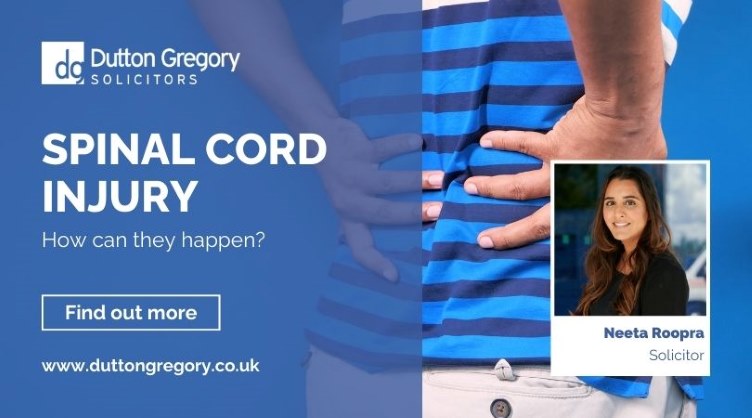A traumatic spinal cord injury can be caused by a sudden, traumatic blow to your spine. The majority of these injuries happen from preventable accidents such as:
- Road traffic accidents: Collisions, rollovers, and being struck by a vehicle can cause significant trauma to the spine.
- Accidents at work: Falls from heights or being crushed by a falling object.
- Sports injuries: Contact sports like football, rugby, and hockey, as well as non-contact sports like diving and gymnastics, can increase the risk of spinal cord injuries.
- Horse riding accidents
Accidents that cause spinal cord injuries can change someone’s life forever. Sometimes serious spinal injuries aren’t always immediately obvious after an accident because symptoms such as numbness and paralysis can develop gradually. At Dutton Gregory Solicitors our expert Personal Injury Team are here to help anyone who has sustained a spinal cord injury. We aim to help people have the chance to live a fulfilled life by taking their exact circumstances into account and signposting them to the help they need.
What Challenges Do People with Spinal Cord Injuries Face?
The spinal cord is an extension of our brain, and it is made up of many nerves that carry messages to the rest of our body. Spinal cord injuries affect our nervous system, by disrupting and damaging the messages between our brains and bodies.
All spinal cord injuries are serious, but every person and accident is different, so the physical symptoms of spinal cord injuries can vary significantly. You can have a complete spinal cord injury (where all feeling and ability to control movement is lost) or an incomplete one (where you have some sensory function or ability to move).
People with spinal cord injuries face a wide range of challenges, both physically and emotionally. Here are some of the most common:
Physical Challenges:
- Loss of movement: Depending on the location of the injury, individuals may experience paralysis or weakness in their arms, legs, or other body parts.
- Loss of sensation: This can include numbness, tingling, or pain below the level of the injury.
- Bowel and bladder dysfunction: Many people with spinal cord injuries lose control of their bowel and bladder functions, requiring specialised care and management.
- Respiratory problems: Injuries to the upper spinal cord can affect breathing, requiring assistance with ventilation.
- Chronic pain: Neuropathic pain, or pain that arises from damaged nerves, is a common complication of spinal cord injuries.
- Pressure sores: These are skin ulcers that develop due to prolonged pressure on the skin, often in areas that come into contact with wheelchairs or other assistive devices.
- Autonomic dysreflexia: This is a medical emergency that can occur in people with spinal cord injuries above the T6 level. It is characterized by a sudden spike in blood pressure, which can lead to a range of symptoms including headache, sweating, flushing, and nausea.
Emotional Challenges:
- Depression and anxiety: The loss of independence and physical abilities can lead to feelings of depression and anxiety.
- Grief and mourning: Many individuals experience a sense of grief and loss as they adjust to their new reality.
- Body image issues: Changes in physical appearance can affect self-esteem and body image.
- Social isolation: The challenges of mobility and communication can sometimes lead to social isolation.
- Financial difficulties: The costs of medical care, assistive devices, and modifications to the home can be significant.
It's important to note that the challenges faced by individuals with spinal cord injuries can vary greatly depending on the severity and location of the injury, as well as personal factors such as age, support systems, and coping mechanisms.
According to the World Health Organisation, globally over 15 million people are living with spinal cord injury and around 20-30% of people with spinal cord injuries suffer from depression.
How We Can Help if You’ve Suffered a Spinal Cord Injury
If you or a family member has suffered a spinal injury, claiming compensation will often not be your first thought. Sadly, no amount of money can reverse what has happened, but if you or a loved one sustained a spinal cord injury and it was someone else’s fault, our dedicated solicitors could help you claim compensation.
Our expert lawyers have years of experience helping people with spinal cord injuries and with their expertise, they can take your exact situation into account to secure the best possible compensation for you. We can help you access:
- Specialist private rehabilitation;
- Loss of earnings, if you’ve had to take time off work, or it can account for earnings you may miss out on in the future if you’re sadly unable to return to work.
- The resources you need to adjust to a life with your injury, which can include anything from a wheelchair, cuffs for picking up objects, adaptations to your home, or even a new house.
- Any therapy you might benefit from, including physiotherapy, counselling, occupational therapy and speech and language therapy;
- Pain management experts.
To see whether you could be entitled to make a claim for compensation, contact our Personal Injury team today and we can give you a better idea of how we can help you live with your injuries in the best way we can.








